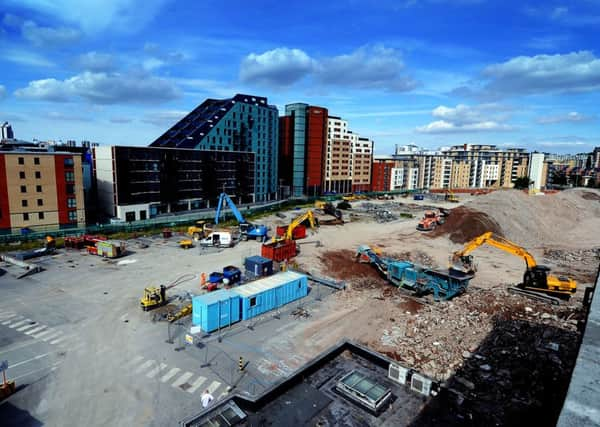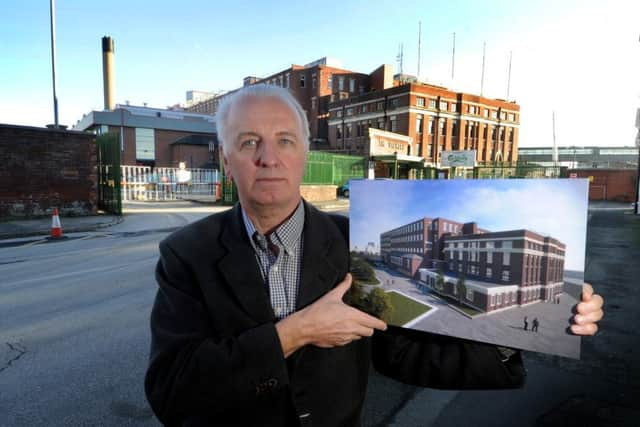Property developer questions Arup’s role in Leeds


Peter Connolly, of Yorkshire Design Group, called it “Arup-isation” and argued that the interests of the company’s clients may not always match those of the city.
He made the comments at a roundtable discussion earlier this week on the future development of Leeds.
Advertisement
Hide AdAdvertisement
Hide AdMr Connolly gave the example of the Tetley Brewery scheme to support his argument.


Arup acted on behalf of client Carlsberg on its 23-acre site.
Carlsberg closed the brewery - one of the city’s oldest businesses - in 2011 and demolished it a year later to make way for a car park.
The old headquarters was converted into a celebrated art gallery, The Tetley.
Advertisement
Hide AdAdvertisement
Hide AdMr Connolly said the demolition of the brewery was a lost opportunity for the city.
He was involved with a rival scheme to develop a data centre, apartments and a park. The data centre would have provided heating for the homes.
The brewery site is in the South Bank area of Leeds, a key regeneration area and marketed as one of the best redevelopment opportunities in Europe.
Mr Connolly went on to list various projects in which Arup is involved in the city, including the South Bank masterplan, the flood alleviation scheme and the review last year of the council’s planning department.
Advertisement
Hide AdAdvertisement
Hide AdHe has played a leading role in the regeneration of post-industrial Leeds since the 1980s, most notably the area around the city’s waterfront including The Calls.
Leeds City Council wants to transform the former industrial heart of the city into a 21st century community with family-friendly homes, open spaces and transport connections linking to the new train station for HS2, the high-speed rail link between London and the North of England.
The Yorkshire Post put the comments to Arup.
In response, it issued a statement from Jim Johnson, the Leeds office leader.
He said: “Arup is a global firm and we have been working in Leeds for 25 years and playing an active part in the local community.
Advertisement
Hide AdAdvertisement
Hide Ad“We are proud to have worked on a number of projects including the Leeds Arena, Wellington Place and the redevelopment of the old Tetley Brewery site - and it’s testament to the quality of our work and the value we offer our clients that they choose to work with us.
“Our work with Carlsberg has ensured that the closure of the brewery leaves a positive legacy for Leeds in the form of The Tetley, a new art gallery and community space, which has been very well received in the city.
“We have also delivered the first step towards a new city centre park envisaged in the Leeds South Bank planning framework.
“As a firm and as individuals, we want to use our skills and work in collaboration with our clients to make a positive impact.”
Advertisement
Hide AdAdvertisement
Hide AdA spokeswoman for Leeds City Council said: “This isn’t appropriate for Leeds City Council to comment on.”
Visions of the future in Georgian chapel
A converted chapel in an old industrial area of Yorkshire played host to a small congregation of property developers, investors, entrepreneurs, community organisers and academics.
They met in Leeds at Salem Church, the home of telecoms firm Aql, to discuss how cities can become better places for people to live.
Chris Brown, chief executive of Igloo Regeneration, asked the dozen or so invited guests to suggest manifesto points for a “liveable Leeds”.
Advertisement
Hide AdAdvertisement
Hide AdThe responses were many and varied. Suggestions included playgrounds, art installations, improved routes for pedestrians and cyclists, a 21st century transport network, world-class schools, better housing, differential parking charges, sustainable internet connectivity and the closure of City Square to traffic.
Todd Hannula, an entrepreneur, told the gathering that if businesses in the city took greater responsibility for their surrounding communities it would reduce the need for public agencies.
Speaking afterwards, he said the Victorian industrialists who became great philanthropists are remembered for their social impact, not for how much money they made.
Nicholas Dyson, a partner at Blacks Solicitors, helped organise the roundtable debate as a follow-up to The Yorkshire Post Business Club meeting at the end of last year.
Advertisement
Hide AdAdvertisement
Hide AdHe said: “I have stake in the city. I am from here, I grew up here. My parents and my grandparents lived in the city and I want to play my part in helping shape its future.
“As a citizen in the city and as a partner at a business in the city, I recognise that I know a lot of people who are involved in funding and making things happen so I see I can help facilitate some of the changes and make connections that will help improve our city and make it a better place.
“There is incredible stuff happening in this city.”
Prevalent player in city region
Ove Arup founded the eponymous firm in 1946 with a focus on structural engineering.
Arup opened in Leeds in 1989 with less than 25 employees.
The firm celebrated its 25th anniversary in the city in September with a party at The Tetley.
It now has around 250 employees.
Advertisement
Hide AdAdvertisement
Hide AdA press release issued at the time said: “The firm has been a prevalent player in the city region and involved in many of the iconic schemes through the city across the years.”
It listed other projects including the Rose Bowl, Headingley Carnegie and the music and art installation in Neville Street.
Sir Ove Arup was born in Newcastle in 1895, the son of a Danish consul, and died in 1988 at the age of 93.